Apple Ordered to Pay University of Wisconsin $234 Million in A7/A8 Patent Lawsuit
 Apple has been ordered to pay the University of Wisconsin's intellectual property management arm $234 million in damages for infringing on one of its processor patents, reports Reuters.
Apple has been ordered to pay the University of Wisconsin's intellectual property management arm $234 million in damages for infringing on one of its processor patents, reports Reuters.
Earlier this week, a jury ruled Apple had infringed on a patent owned by the Wisconsin Alumni Research Foundation (WARF) when it used patented technology in its A7, A8, and A8X processors included in the 2013 and 2014 iPhone and iPad lineup.
WARF had originally asked for damages as high as $862 million, but later lowered that request to around $400 million. Apple will be paying a little more than half of the requested amount with the $234 million award WARF received from the jury. The presiding judge ruled Apple had not willfully infringed on WARF's patent, so the damages award will stay at $234 million.
The patent in question, titled "Table based data speculation circuit for parallel processing computer," was originally granted in 1998 and covers a method for improving processor efficiency. It lists several current and former University of Wisconsin researchers as inventors.
The Wisconsin Alumni Research Foundation has also filed a second lawsuit against Apple for the same patent, accusing the company of using the technology in the A9 and A9X chips found in the iPhone 6s, 6s Plus, and iPad Pro.
For the first six months of 2015, Apple averaged a daily net profit of $134.7 million, which means the judgment will account for approximately 42 hours of profit. Apple has said it will appeal the ruling.
Popular Stories
Apple's next-generation iPhone 17 Pro and iPhone 17 Pro Max are less than three months away, and there are plenty of rumors about the devices.
Apple is expected to launch the iPhone 17, iPhone 17 Air, iPhone 17 Pro, and iPhone 17 Pro Max in September this year.
Below, we recap key changes rumored for the iPhone 17 Pro models:Aluminum frame: iPhone 17 Pro models are rumored to have an...
The long wait for an Apple Watch Ultra 3 appears to be nearly over, and it is rumored to feature both satellite connectivity and 5G support.
Apple Watch Ultra's existing Night Mode
In his latest Power On newsletter, Bloomberg's Mark Gurman said that the Apple Watch Ultra 3 is on track to launch this year with "significant" new features, including satellite connectivity, which would let you...
Apple is developing a MacBook with the A18 Pro chip, according to findings in backend code uncovered by MacRumors.
Earlier today, Apple analyst Ming-Chi Kuo reported that Apple is planning to launch a low-cost MacBook powered by an iPhone chip. The machine is expected to feature a 13-inch display, the A18 Pro chip, and color options that include silver, blue, pink, and yellow.
MacRumors...
The upcoming iPhone 17 Pro and iPhone 17 Pro Max are rumored to have a slightly different MagSafe magnet layout compared to existing iPhone models, and a leaked photo has offered a closer look at the supposed new design.
The leaker Majin Bu today shared a photo of alleged MagSafe magnet arrays for third-party iPhone 17 Pro cases. On existing iPhone models with MagSafe, the magnets form a...
Apple is planning to launch a low-cost MacBook powered by an iPhone chip, according to Apple analyst Ming-Chi Kuo.
In an article published on X, Kuo explained that the device will feature a 13-inch display and the A18 Pro chip, making it the first Mac powered by an iPhone chip. The A18 Pro chip debuted in the iPhone 16 Pro last year. To date, all Apple silicon Macs have contained M-series...
Apple today seeded the second betas of upcoming iOS 18.6 and iPadOS 18.6 updates to public beta testers, with the betas coming just a day after Apple provided the betas to developers. Apple has also released a second beta of macOS Sequoia 15.6.
Testers who have signed up for beta updates through Apple's beta site can download iOS 18.6 and iPadOS 18.6 from the Settings app on a compatible...
iOS 26 and iPadOS 26 add a smaller yet useful Wi-Fi feature to iPhones and iPads.
As spotted by Creative Strategies analyst Max Weinbach, sign-in details for captive Wi-Fi networks are now synced across iPhones and iPads running iOS 26 and iPadOS 26. For example, while Weinbach was staying at a Hilton hotel, his iPhone prompted him to fill in Wi-Fi details from his iPad that was already...
Apple hasn't updated the AirPods Pro since 2022, and the earbuds are due for a refresh. We're counting on a new model this year, and we've seen several hints of new AirPods tucked away in Apple's code. Rumors suggest that Apple has some exciting new features planned that will make it worthwhile to upgrade to the latest model.
Subscribe to the MacRumors YouTube channel for more videos.
Heal...
As part of its 10-year celebrations of Apple Music, Apple today released an all-new personalized playlist that collates your entire listening history.
The playlist, called "Replay All Time," expands on Apple Music's existing Replay features. Previously, users could only see their top songs for each individual calendar year that they've been subscribed to Apple Music, but now, Replay All...
 Apple has been ordered to pay the University of Wisconsin's intellectual property management arm $234 million in damages for infringing on one of its processor patents, reports Reuters.
Apple has been ordered to pay the University of Wisconsin's intellectual property management arm $234 million in damages for infringing on one of its processor patents, reports Reuters. 





















